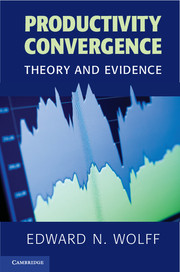Book contents
- Frontmatter
- Contents
- Acknowledgments
- 1 Introduction
- 2 An Overview of Modern Growth Theory
- 3 The Measurement and Estimation of Productivity Growth
- 4 Long-Term Record among the Advanced Industrial Countries
- 5 Postwar Record on Productivity Performance on the Aggregate Level among the Advanced Industrial Countries
- 6 Further Details on the Role of Education and Technology in the Productivity Performance among the Advanced Industrial Countries
- 7 Productivity Performance on the Industry Level among the Advanced Industrial Countries
- 8 The Productivity Slowdown
- 9 Postwar Economic Performance among Countries of the World
- 10 Recapitulation and Future Prospects for Growth
- Bibliography
- Index
4 - Long-Term Record among the Advanced Industrial Countries
Published online by Cambridge University Press: 05 June 2014
- Frontmatter
- Contents
- Acknowledgments
- 1 Introduction
- 2 An Overview of Modern Growth Theory
- 3 The Measurement and Estimation of Productivity Growth
- 4 Long-Term Record among the Advanced Industrial Countries
- 5 Postwar Record on Productivity Performance on the Aggregate Level among the Advanced Industrial Countries
- 6 Further Details on the Role of Education and Technology in the Productivity Performance among the Advanced Industrial Countries
- 7 Productivity Performance on the Industry Level among the Advanced Industrial Countries
- 8 The Productivity Slowdown
- 9 Postwar Economic Performance among Countries of the World
- 10 Recapitulation and Future Prospects for Growth
- Bibliography
- Index
Summary
Introduction
Explanations of the productivity catch-up almost all involve so-called advantages of backwardness, a term first coined by Gerschenkron (1952). The basic idea is that much of the catch-up can be explained by the diffusion of technical knowledge from the leading economies to the more backward ones (also, see Kuznets, 1973). Through the constant transfer of new technology, leader countries and those most closely in their van learn the latest productive techniques from one another, but virtually by definition the follower countries have more to learn from the leaders than the leaders have to learn from them (hence the advantages of backwardness).
This mechanism has two implications: First, it means that those countries that lag somewhat behind the leaders can be expected systematically to move toward the level of achievement of the leaders. Second, the mechanism undermines itself automatically as follower countries gradually eliminate the difference between their own performance and that of the countries that were ahead of them – that is, the very fact of convergence means that the differential learning opportunities that are the source of these advantages of (slight) backwardness will exhaust themselves. On an analytical level, this hypothesis would imply faster productivity growth for the (initially) more backward economies relative to the more advanced ones, but the gap in productivity performance would gradually diminish over time as convergence was achieved.
- Type
- Chapter
- Information
- Productivity ConvergenceTheory and Evidence, pp. 124 - 168Publisher: Cambridge University PressPrint publication year: 2013

